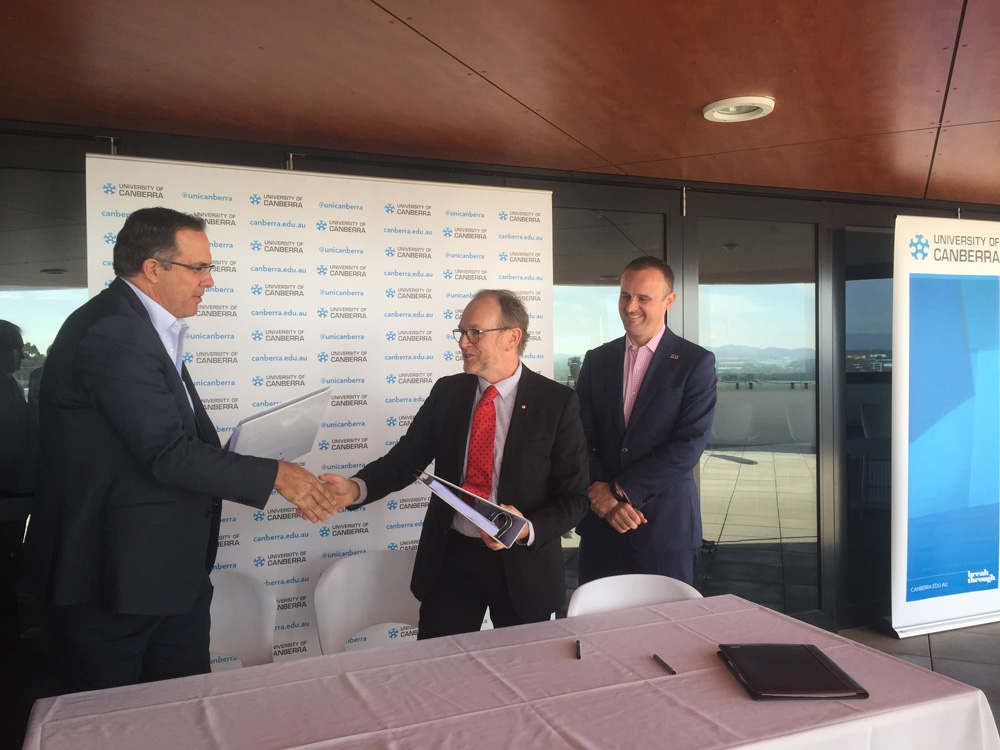Claudia Doman
21 April 2016: A cutting-edge, sustainable residential development will rise at the University of Canberra campus over the next two decades thanks to a new agreement with one of Australia's leading land developers signed this morning.
The agreement between the University and CIC Australia, Peet Limited's Canberra-based wholly owned subsidiary, will see a multi-stage development of up to 3,300 residences, a mix of units and townhouses, constructed over a 15 to 20-year period. The gross value of the project is currently modelled to be $1.7 billion but this will depend upon property values over time.
The University has agreed with the ACT Government that a maximum of 200 dwellings will be released per annum starting in 2017, contributing to growth and employment in the Territory.
University of Canberra Vice-Chancellor Professor Stephen Parker said the agreement is a great step towards achieving the long-term vision of the institution's campus development plan.
"It is great to see another stage of our 'Educated Life' vision coming to fruition. Our vision foresees that by 2030 our campus will be a leading example of how a modern world-class university transformed its physical surroundings to create an integrated learning community where scholars, students and the public intermingle," Professor Parker said.
"This residential development, which is part of the University's Campus Community precinct, will see a mix of students, faculty, staff, alumni and members of the general public living in a modern, progressive, sustainable, edgy community.
"It will be a benchmark for contemporary living that demonstrates innovative planning and design in architecture, landscape and streetscape."
The project will fund a new professor position in urban design and it will also be a reference site for research projects in housing design, urban design and public health.
"Students studying architecture, landscape architecture, building and construction management, urban planning and other relevant disciplines will be involved in project working, making this probably the largest work-integrated learning project in the history of Australian higher education," Professor Parker said.
"Over the next 10-15 years, staff and students will work with the developers, pursuant to a Collaboration Agreement, to generate an evidence-based new way of urban living."
He said the development will greatly add to the campus community, to Belconnen and to Canberra itself, further cementing the University of Canberra as a vital component of the nation's capital.
Professor Parker and Managing Director and CEO of Peet Ltd, Brendan Gore, signed the agreement, which was witnessed by ACT Chief Minister Andrew Barr MLA.
Mr Barr said the announcement was important as higher education is Canberra's single biggest export industry and one of the biggest non-government contributors to the Territory economy.
"This, along with all the other initiatives that are supporting the growth of our higher education sector, go to underpin our city's economic viability in the long term. It will also contribute to a better educated community, better amenities for students and the Canberra community more broadly," he said.
"We see an alignment here at the University of Canberra in a number of strategic ACT priorities coming together with the University's strategic priorities, and there is no better example of that than the University of Canberra Public Hospital. That's just one of many projects that we're working in partnership with the University here in Belconnen."
Mr Gore said the agreement was a significant step towards an exciting venture with the University of Canberra, which would expand Peet's CIC Australia business in the ACT and demonstrate its breadth of experience in residential development.
"Peet is looking forward to progressing the project and shares the University and ACT Government's vision for a transformational residential development," he said.
Watch our video story below:



